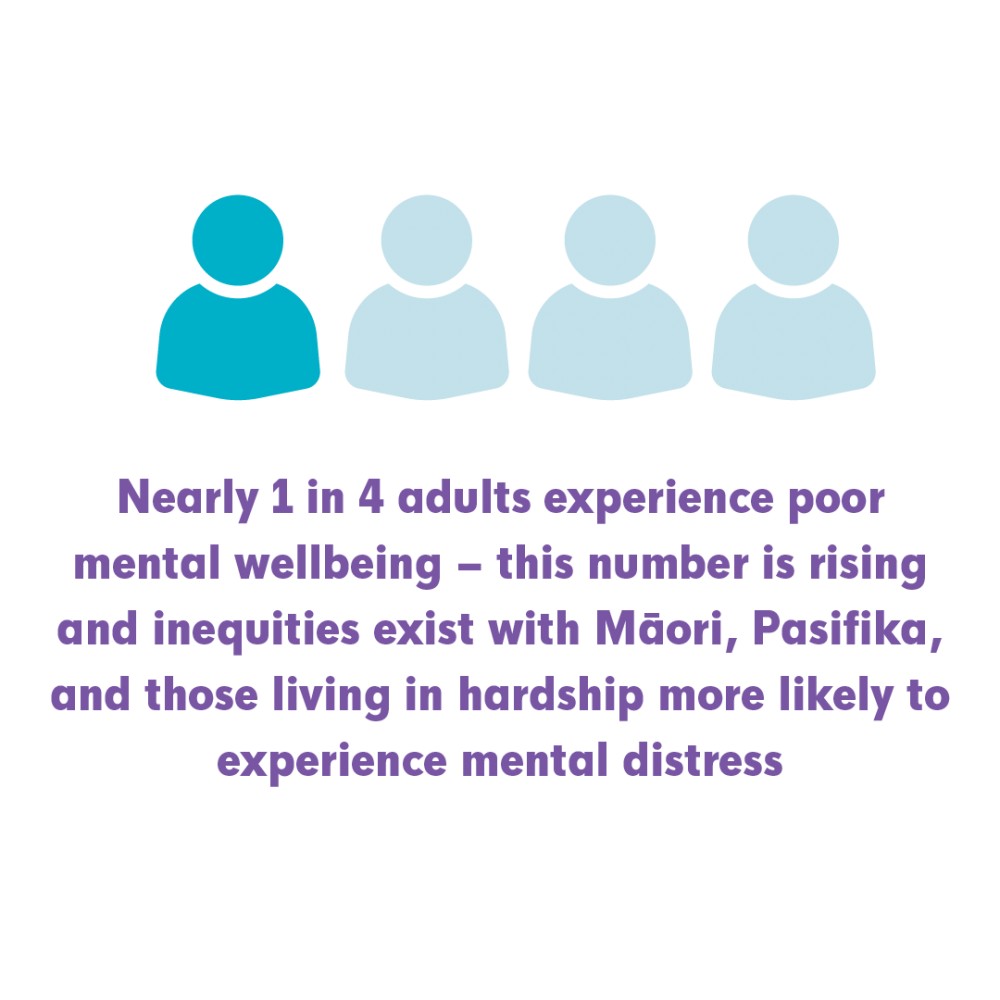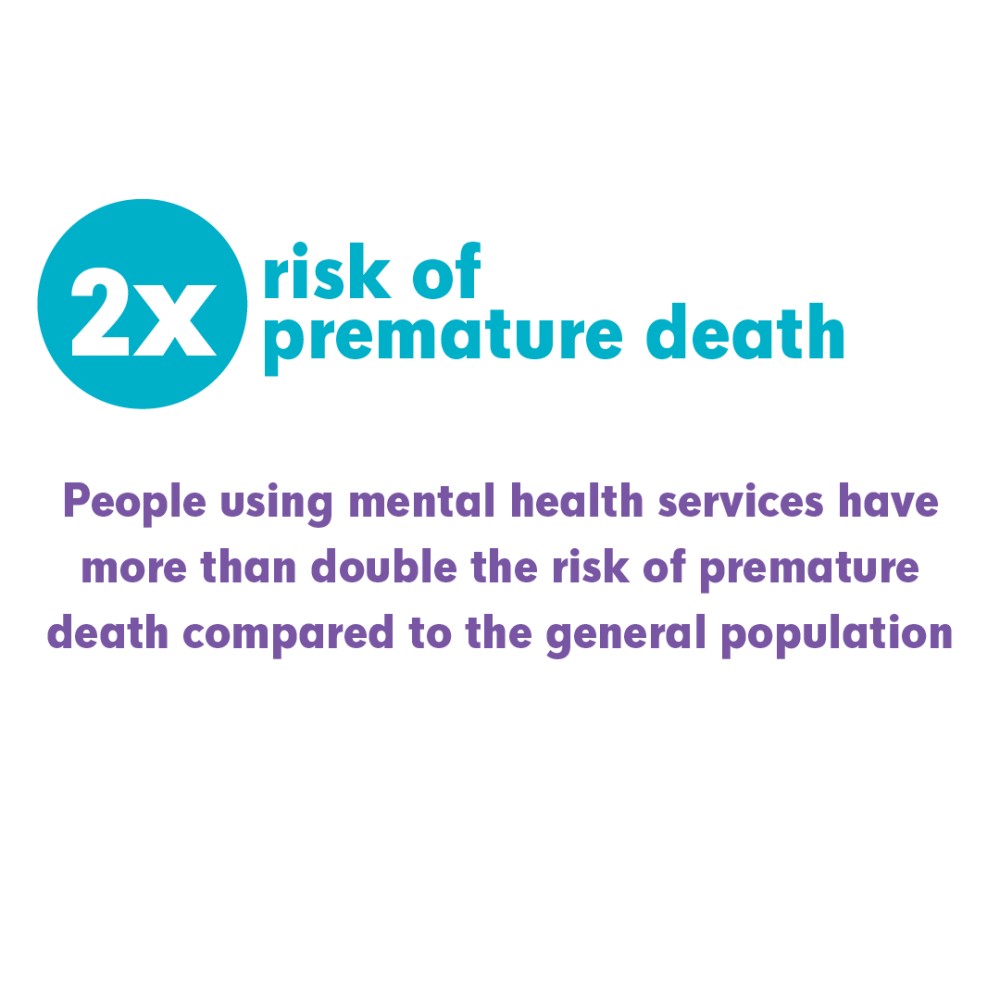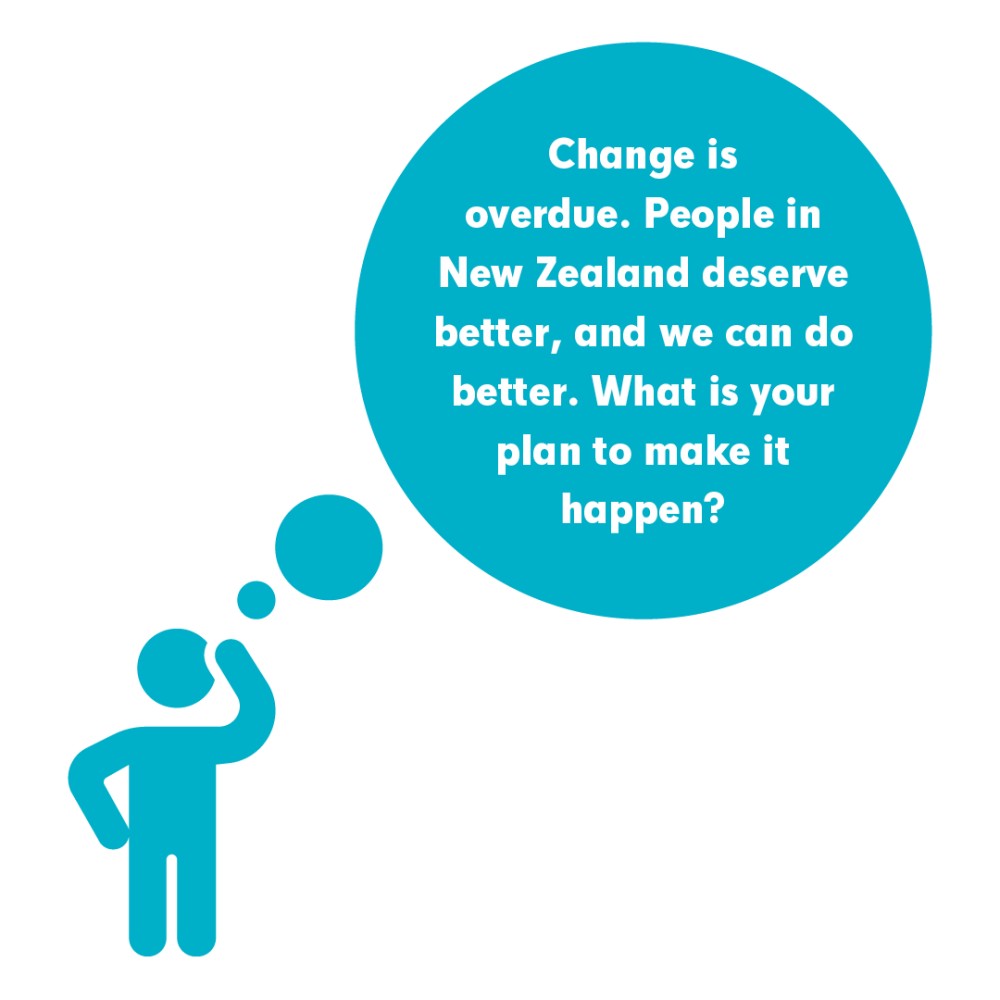The wero (challenge)
This election, people across Aotearoa need to hear how your party will transform our mental health and addiction system to better protect and improve the mental wellbeing of all people.
What actions will your party take to empower people and communities to build positive mental wellbeing, and ensure everyone has equitable access to timely, safe, effective, culturally responsive mental health care, informed by Te Tiriti o Waitangi and the expertise and experiences of people with lived experience of mental illness or distress?
What’s your investment strategy to put these actions into practice over the long term, and how will it make life better for the 1 in 5 New Zealanders who will experience mental illness and/or addiction this year?
To help your party meet our wero, we offer our vision for change, backed by strong evidence and consultation from people with lived experience of mental distress or illness.

The moemoeā (vision)
We all want Aotearoa to be a place where people enjoy a good level of mental wellbeing, where people who experience mental distress or addiction are treated with dignity and given the choice of holistic, effective support, when and where they need it to recover and regain their wellbeing. Family and whānau will have the support and information, and services have the flexibility and resourcing, to meet these needs.
The cost and investment

The shortfalls in our system are costing us all. People using mental health services in Aotearoa have more than double the risk of premature death (before the age of 65) compared to the general population, including from preventable and treatable health issues. The annual cost of serious mental illness and addiction is high at $12bn per year (5% of GDP).
Mental health investment must be commensurate to need. The majority of DHB and Ministry of Health expenditure is on services but it must be spread across prevention, promotion and effective support and services. Doing so is estimated to produce large cost savings.
Change is overdue. People in New Zealand deserve better, and we can do better. What is your plan to make it happen?
Creating a safe, strong and supportive system
To make meaningful change, we must invest in growing a strong, empowered, community-driven, and culturally safe workforce, which includes and resources peer support in every service.
The mental health workforce and system must:
- Be guided by lived experience and whānau leadership.
- Be representative of, and effective for our diverse communities, including Māori, Pasifika, Asian communities, migrants, people with disabilities, people with backgrounds as refugees, rainbow communities, and those across the life course spectrum.
- Reflect whānau, hapū, and iwi aspirations by including kaupapa Māori approaches and Māori-led solutions and being responsive to people’s holistic needs. This is key to reducing inequitable health outcomes for Māori.

12 actions to create meaningful change
The MHF believes there are four priority areas for change, backed by clear evidence, that should guide your plan. We offer examples of 12 tangible actions that can be adopted – we acknowledge this is not an exhaustive list.
To ensure the actions taken are meaningful and responsive, we must have access to current, robust data which helps us to understand the scale of need across population groups, and how the needs change over time. We recommend establishing a comprehensive, national survey.
Effective crisis response and supports
People experiencing a mental health crisis deserve a compassionate, timely, and effective response that enables them to stay connected with their community supports and access the full continuum of mental health services. Whānau need support so they, in turn, can provide meaningful support to their loved one experiencing mental health or addiction challenges.
Support recovery and wellness
Too many people are discharged from inpatient services with no place to stay and no plan for their ongoing recovery. We must support people to recover from mental illness and distress in our communities by ensuring they have access to post-discharge follow-up support, meaningful employment, education, and healthcare.
Change mental health laws
Honouring our Te Tiriti o Waitangi and international treaty obligations – such as the UNCRPD and UNDRIP – in law and practice will uphold people’s mana, dignity, and rights. It will give people more autonomy and partnership over their care and treatment, increase alternatives to compulsory treatment, and foster community inclusion, recovery, and the ability to live full and meaningful lives.
We all have mental health. The post-election government will be charged with protecting, maintaining, and growing our mental health system and the mental health of New Zealanders to ensure our collective and individual mental health is strong and ready to support us through the challenges and opportunities ahead. New Zealanders are listening now to hear how you will do that. More than ever, they understand the importance of investing in and protecting their mental health and the mental health of those they love.
We look forward to hearing how political parties will answer this wero this election.
Download our general election statement
Authorised by Shaun Robinson, Mental Health Foundation of New Zealand, Eden 3, Ground Floor, 16 Normanby Road, Mt Eden, Auckland 1024.
